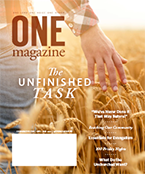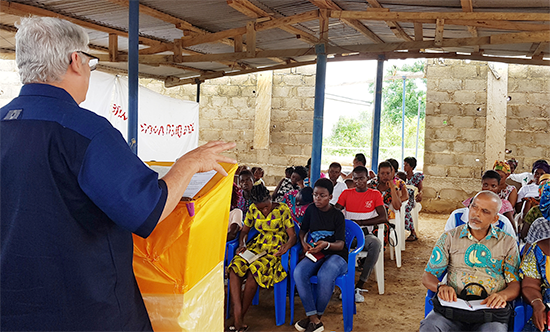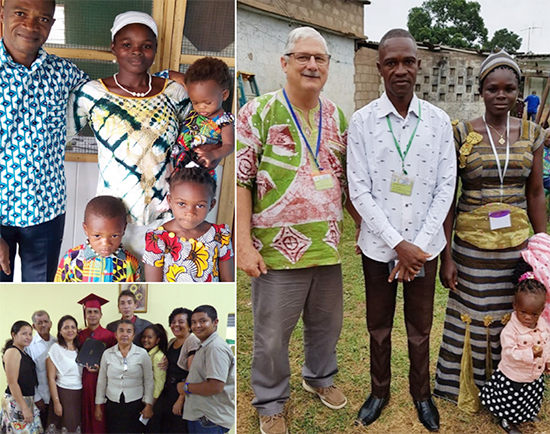
April-May 2020
The Unfinished Task
------------------
|





Unfinished
By Kenneth Eagleton, M.D.
When it comes to getting things done, I am a list person. I know that is not for
everyone, but when I have multiple tasks to accomplish, I sit down and make a list.
At the end of the day or week, it helps me to review the list as a reminder of what
I accomplished and of the things still left unfinished and needing my attention.
We can use this analogy for the missions endeavor.
To achieve the goal of having a spiritually mature, self-sustaining association of churches capable of reproducing themselves on any given field, a large “list” of tasks needs to be accomplished. This list is not completed in a short span of time. It takes decades and the cooperation of many to see this achieved. It is thrilling to say I have been privileged to see this become a reality on many IM fields.
As we look at the “list” of tasks accomplished over the years, we can stop and praise the Lord for the many things He has done and celebrate the accomplishments of God’s people. Over the decades, Free Will Baptists from the United States have sent out missionaries who dedicated themselves to evangelism, discipleship, and church planting. As Christians in these new churches matured, leaders were trained for various leadership roles, including pastor. Churches were turned over to local leadership, and associations of churches were organized.
After several decades, on certain fields, the difficult decision was made for North American missionaries to withdraw strategically and leave the work to local leadership. IM has done this in Brazil, Panama, Cuba, Ivory Coast, South Korea, and India.
It would be easy to jump to the conclusion that the task is finished, and our “list” is complete in those countries. However, much is still unfinished, and this necessitates partnership to carry on the good work begun. Let’s look at some of those unfinished tasks and see why our partnerships with these associations of Free Will Baptist churches is so important.
The Unreached
Though scores and even hundreds of Free Will Baptist churches faithfully preach the gospel of Jesus Christ in these countries, the need of the lost is still overwhelming. Millions of people have not heard the name of Christ. In the case of India, more than a billion people still do not know Jesus. Thousands of people groups (ethnic groups) are still without a gospel witness. To make a dent in this need, we must continue to partner with Free Will Baptists in these countries to facilitate reaching a greater number of people, cities, and states.
Besides the pastors and church-planters supported by our overseas churches, in strategically important situations, IM comes alongside co-laborers and contributes so other church planters can be sent. In Brazil, we sponsor a couple starting a Free Will Baptist church in another state, in a poor community where no church of any type exists. We participate in associational initiatives.
Currently, Panama has a program to start three new churches, Cuba plans to establish 50 churches over a five-year period, and Côte d’Ivoire set a goal of starting 100 new churches! In India, we partner with a network of Indian churches sending church-planters to unreached people groups.
During one of my recent trips, I met one of the church-planters we help sponsor. We will call him Sugra. Despite his small stature and frail-looking body, he works as a bike rickshaw driver. As he pedals, he finds a way to witness to his passengers. His boldness, even in the face of open opposition, has paid off. Several people have become Christ-followers. Sugra is now the leader of several house-churches.

Sending short-term teams, such as E-TEAM, to serve alongside local believers in evangelistic opportunities, is also an effective way of cooperating with brothers and sisters in other countries. E-TEAMs, composed of high school students, deploy around the globe each summer. About four years ago, a team traveled to Araras, Brazil. They were invited to visit a language school that teaches English, providing an excellent opportunity for the local students to practice with native English speakers. An invitation was extended for the students to attend church to see a presentation the American teens would give. Several attended. As a result, a teacher and a student became Christ-followers and are still in church today.
Mutuality
Christians have a biblical mandate to live in fellowship, community, and mutuality (see the “one another” commandments). Interdependence is the biblical principle we are to follow, not independence. We are to work together in the Body of Christ, each using his or her gifts and resources for Kingdom work, not local fiefdoms or personal kingdoms.
We do not intend to totally break away from the works in which we have invested for many decades. We want to stay connected, encouraging them to be part of the global Free Will Baptist family, and sharing mutual encouragement, growth, and work.
Last year, I spoke at a retreat for Christian medical personnel in Cuba. As I shared biblical principles that apply to their profession and from my own experiences as a physician, they were encouraged. These medical professionals left better equipped to live and witness as Christians in their workplace.
Missions
The Great Commission is not meant only for North American Christians. It is for all Christians, including those who live in places traditionally called the mission field. Our churches on many of these fields understand they have a responsibility in world evangelism. God has called many of them to join in sharing the gospel globally.
Free Will Baptists in Brazil have sent missionaries to Ireland, Côte d’Ivoire, Bolivia, Uruguay, China, Turkey, and other countries. Panama is starting a church in Venezuela. Cuba currently has missionaries in Uruguay and Côte d’Ivoire. India has planted churches in Nepal. Côte d’Ivoire is extending the Kingdom in Ghana and Burkina Faso. South Korea has started Free Will Baptist churches in Pakistan.
Sending cross-cultural missionaries is a new endeavor for many of these countries. They turn to us for advice, consultation, and financial help. Our mission department has 85 years of cross-cultural experience. We can share that experience and walk with them as they take their first steps. Many stateside constituents are also eager to be part of this exciting reproduction of mission efforts.
One of our newest missionaries from another field is Jonas Kambou and his family. Until recently, Jonas was a student at the FWB Bible institute in Côte d’Ivoire, preparing for the ministry. He has a real burden for the neighboring country of Ghana. When it came time for his pastoral internship, he asked to do it in Ghana. This had never been done. Jonas was assigned to work under a Ghanaian pastor attempting to plant a church on the eastern side of the country.
Soon after Jonas arrived with his family in November 2018, the Ghanaian pastor gave up and left. Jonas was left by himself. Instead of returning to Ivory Coast, he stayed and dedicated himself to the hard work of starting a church from scratch among people who spoke a different language and had different customs. He told me the first months were very hard. His family had to learn the language and start developing relationships. After nine months in-country, ten people are believers and a small congregation meets weekly.
Training
Free Will Baptists have organized leadership training programs in all the countries previously mentioned. Most of these, begun by missionaries, are now administered by local leaders, under the auspices of the various associations of Free Will Baptist churches. Nearly all of them still need financial help from IM to continue to train pastors, lay preachers, youth leaders, Sunday School teachers, small group leaders, etc. Besides the financial help, we also send teachers to train in specific areas.
Our partnership also has helped many Free Will Baptist leaders benefit from the Leadership Matters Course (LMC), provided by our partner organization, International Training Alliance (ITA), of which we are a member. Each year we sponsor or contribute to many camps, retreats, and workshops on different fields.
We recently mediated a partnership between our Bible institute in Panama and Welch College to upgrade the training of the Panamanian teachers so they will be better prepared for training their leaders. In Ivory Coast, we worked alongside the local national association to expand the availability of training programs for the various educational levels of the candidates. The new Bible College training has mobilized approximately 60 new students.
Efrain was trained as an economist, but God called him to preach. Fortunately, our churches in Panama have a seminary for training leaders for the ministry. Efrain attended the seminary and upon completion of his studies, accepted the pastorate of the Free Will Baptist church in Las Tablas. But the Parita church was also without a pastor, so he assumed the leadership of both churches. Being a gifted teacher, he has been recruited by the seminary as a part-time teacher as well. His training at the seminary and at LMC equipped him to become a leader in our denomination in Panama.
Leadership training is essential to guarantee sustainability of the works and ensure the doctrinal fidelity of future generations.
Outreach Projects
Alongside the preaching of the gospel, we partner with national churches to meet the needs of people in their communities. Many projects are aimed at helping the needy and vulnerable to better take control of their lives and become productive in society. Examples of these projects include adult literacy classes, health and hygiene awareness, income-generating projects, helping children get the necessary documentation to attend school, subsidizing healthcare clinics, nursing homes, schools, and more.
A recent project provided sewing machines to believers in India. They set up a sewing class to teach women how to make clothes, not only for their families, but as a source of income.
In many cases, outreach projects give Christians a legitimate platform to build relationships that earn local believers the right to speak spiritual truth into the lives of people. This is especially important in areas where the dominant religion persecutes Christians or makes it hard for them to share their faith.
Properties
As a general policy, each local church must purchase property for its congregation or buy land and build a church building. However, some churches are located in poor communities that cannot afford the total cost for their own place of worship. In these cases, we provide financial help. For instance, in Côte d’Ivoire, along with the Ivorian national association, we may pay to put a roof on a new church building if the congregation builds the walls. The association determines which churches need assistance.
In many metropolitan areas, property values have sky-rocketed, making it almost impossible for congregations to purchase land. However, these cities house the greatest concentration of lost people. Many times, we find it strategic to help a local church buy property, so we can have a strong witness in highly populated communities.
In Cuba, churches are not allowed to buy land and construct a building. However, they are permitted to buy houses and use them as places of worship. We help them take advantage of this opportunity. More than 20 house churches do not yet have a permanent place of worship.
We currently have nearly 800 churches and approximately 33,500 believers in the six countries mentioned in this article. The more we expand, the more we can praise the Lord for the items we have finished on our “list.” However, like my personal lists, the list seems to keep expanding, with unfinished tasks as new opportunities and challenges arise.
The opportunities to get involved and make a difference in the world in which we live have never been so varied and accessible to stateside Free Will Baptists who can partner with their counterparts in other parts of the globe. The World Missions Offering (WMO) is one of the best opportunities to impact many different people and ministries around the world in a one-stop fashion.
About the Writer: As director of field partnerships for IM, Kenneth Eagleton works directly with leaders in partner countries. He and his wife Rejane have served with IM as missionaries since 1984, first in Côte d’Ivoire and currently in Brazil. Learn more: www.IMInc.org.
|
|

